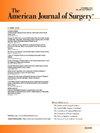Hospital experience with geriatric trauma impacts long-term survival
IF 2.7
3区 医学
Q1 SURGERY
引用次数: 0
Abstract
Background
Hospital experience measured by geriatric trauma proportion (GTP) is associated with in-hospital mortality among geriatric patients. Our goal was to determine the impact of GTP on long-term survival among older trauma patients.
Methods
This was a retrospective analysis of Medicare inpatient claims (2014–2015) of geriatric trauma patients admitted in Florida. GTP was calculated by dividing the number of geriatric trauma patients by the overall adult trauma volume in each hospital. Hospitals were then categorized into tertiles of GTP. Our main outcome was mortality at 30, 90, 180, and 365 days. Multivariable regression was performed to identify the association between GTP and long-term survival.
Results
We included 65,763 geriatric trauma patients. As compared with hospitals in the lowest tertile, patients treated at the highest tertile were associated with lower mortality at 90 days (OR 0.90, 95%CI 0.82–0.98), 180 days (OR 0.90, 95%CI 0.83–0.97), and 365 days (OR 0.91, 95%CI 0.85–0.98).
Conclusions
Higher GTP is associated with improved long-term outcomes. However, mortality following trauma among geriatric patients continues to increase for 12 months.
求助全文
约1分钟内获得全文
求助全文
来源期刊
CiteScore
5.00
自引率
6.70%
发文量
570
审稿时长
56 days
期刊介绍:
The American Journal of Surgery® is a peer-reviewed journal designed for the general surgeon who performs abdominal, cancer, vascular, head and neck, breast, colorectal, and other forms of surgery. AJS is the official journal of 7 major surgical societies* and publishes their official papers as well as independently submitted clinical studies, editorials, reviews, brief reports, correspondence and book reviews.

 求助内容:
求助内容: 应助结果提醒方式:
应助结果提醒方式:


